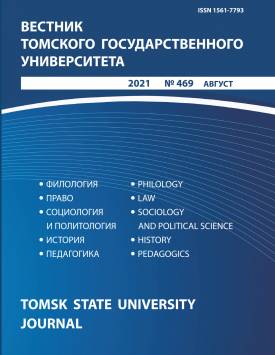Assessment of the Development of Sports Volunteer Movement Using Information Technologies
The aim of the research was to develop a methodology for assessing the level of development of sports volunteer movement in the region on the basis of monitoring the indicators of the organizational and managerial model using information systems to support decision-making. As research methods, we used a group of methods for collecting and processing primary information, including an expert survey, ranking, methods of mathematical statistics, content analysis, high-level expert systems. The article discusses information technologies used in volunteering at the stages of selecting candidates for volunteers and working with them at events. We present an express assessment of the volunteer movement in the region according to four indicators (the number of organizers, volunteers, events, and projects) with a five-point scale each. Express assessment is developed for five types of regions, depending on the population size: (1) up to 500 thousand people; (2) up to 1 million; (3) from 1 to 2 million; (4) from 2 to 3 million; (5) more than 3 million. There are five levels of development of the volunteer movement: high (17-20 points), above average (13-16 points), average (9-12 points), below average (5-8 points), low (0-4 points). The article describes the creation of a decision support information system for the formation of effective interaction between all subjects in the management of the sports volunteer movement in the region. The indicators and criteria of the control unit of the organizational and management model we had developed were taken as a basis. To determine the weight of each criterion, an expert survey was conducted, in which heads of nonprofit organizations of various types, heads and employees of state institutions with expert knowledge in the field of volunteer activities management, practical experience of interaction with them from Omsk, Moscow, Krasnoyarsk, Chita, Yuzhno-Sakhalinsk, Yekaterinburg, and Almaty (Kazakhstan). The article presents two scenarios depending on the level of development of the sports volunteer movement in the region (high and low). However, when specifying the results of the database, the number of scenarios can be increased by levels: low, below average, average, above average, high. The developed methodology makes it possible to approach in a structured way the assessment of the functioning of the volunteer movement in the constituent entity of the Russian Federation and identify its problems. It is also advisable to use the methodology for a comparative assessment of the development of the volunteer movement in the constituent entities of the Russian Federation, including the sports one, which will determine the further vector of the development of volunteering in the region.
Keywords
sports volunteer movement, information technology, decision support systemAuthors
| Name | Organization | |
| Stafeeva Alena Yu. | Siberian State University of Physical Culture and Sports | alenastaf@yandex.ru |
| Kravchuk Tatyana A. | Siberian State University of Physical Culture and Sports | kravchukt@mail.ru |
| Shiler Aleksandr V. | Omsk State Transport University | shilerav@omgups.ru / shiler_alex@inbox.ru |
References

Assessment of the Development of Sports Volunteer Movement Using Information Technologies | Vestnik Tomskogo gosudarstvennogo universiteta – Tomsk State University Journal. 2021. № 469. DOI: 10.17223/15617793/469/31
